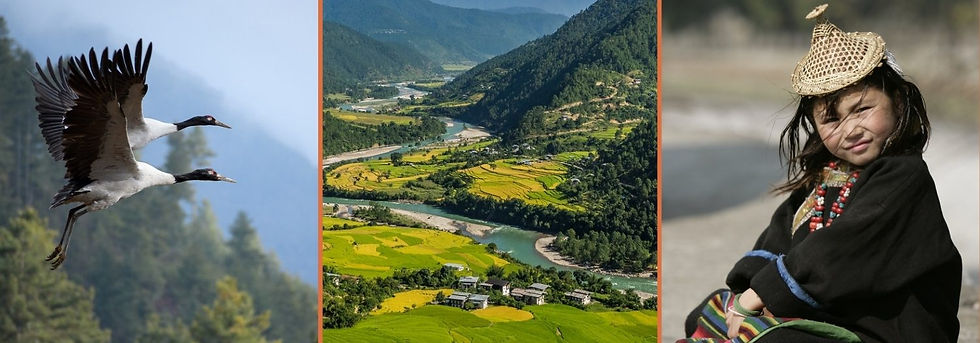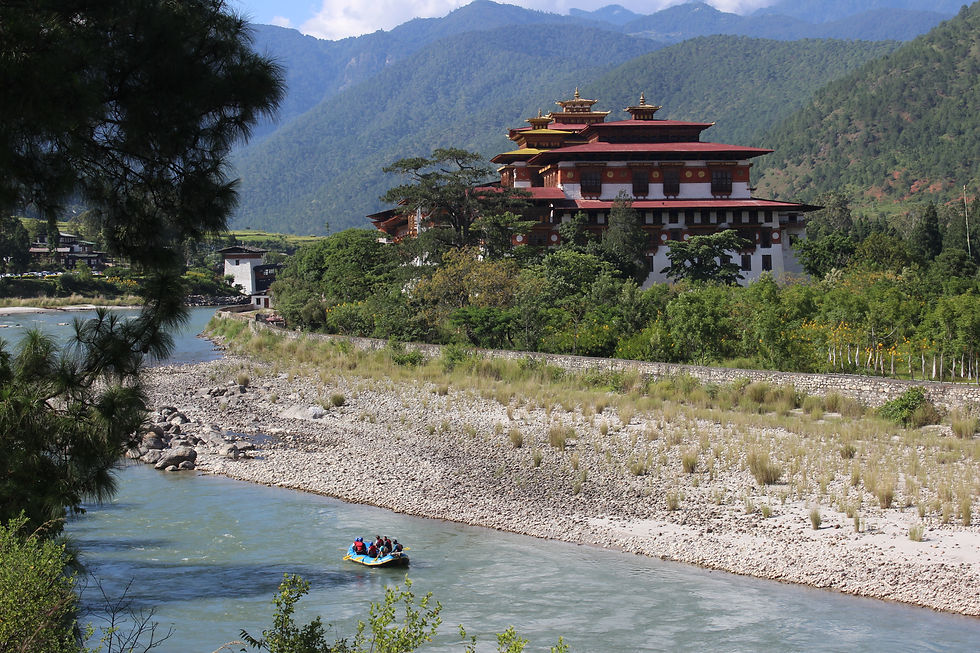Bhutan: How Sustainability Builds Happiness
- Hannah Cluroe
- Nov 7, 2023
- 5 min read
Updated: Nov 7, 2023
Located in the beautiful Himalayas, Bhutan is a small Buddhist country full of culture and tradition. Comparable in size to Switzerland, the small nation was isolated from foreign influence for most of its existence. Only in the late 20th century did the nation begin to welcome travelers, who often visit due to their interest in its stunning natural scenery, impressively preserved culture, and captivating Silk Road and Buddhist history.

Gross National Happiness (GNH) and 4 Sustainability Pillars in Bhutan
Bhutan’s uniqueness is tied in many ways to the fact that it is one of the happiest nations in the world. This is largely due to the Bhutanese government’s dedication to the concept of Gross National Happiness (GNH) – an approach developed and introduced in Bhutan in the 1970s. The concept encompasses various measures that evaluate the country’s overall wellbeing, such as cultural preservation, environmental conservation, and socio-economic development. GNH was officially adopted as a national goal in 2008 and has since been incorporated into the nation’s constitution.
The four pillars of GNH in Bhutan include sustainable and equitable socio-economic development, preservation and promotion of culture, conservation of the environment, and good governance. To uphold each of these pillars, the Bhutanese government employs informed and strategic policies and programs uniquely tailored to each goal. Bhutan utilizes this holistic approach with the goal of improving the nation as a whole. It therefore stands in contrast to most other countries, which simply prioritize their economic wellbeing and focus solely on Gross Domestic Product (GDP).

Many of the GNH-related policies developed by the Bhutanese government revolve around sustainability, which coincides with each of the four pillars defined by the government. One of the country’s most well-known sustainability-related policies is its Sustainable Development Fee.
What is Bhutan’s Sustainable Development Fee?
While Bhutan is no longer closed to foreign tourists, it continues to maintain a thoughtful and sustainable approach to tourism. This approach includes many innovative policies, which ensure that tourism benefits rather than harms the nation. One such policy is the Sustainable Development Fee (SDF), a daily tax that all tourists visiting Bhutan must pay. As its name suggests, it is collected for the purpose of promoting sustainable development across the country. The fee is collected from all tourists coming to Bhutan on a travel visa.
The objective of the SDF is to enable investment in transformative programs that sustain Bhutan’s cultural traditions and the protection of their environment. In the words of Bhutan's tourism site:
"This kingdom is steeped in history, but our gaze is fixed on the future. THE FUTURE REQUIRES US TO PROTECT AND PRESERVE OUR HERITAGE but also to forge new pathways leading forthcoming generations to fresh possibilities. This is our moment of evolution; a moment devoted to ensuring that the opportunities our young people seek are found, and realized, here. Our ancestors gave us roots. Now, we help our descendants take wing."

The SDF also prevents over tourism, ensuring a limit on the number of tourists coming to Bhutan annually, and thereby ensure that the country remains a somewhat isolated nation, free from too much foreign influence. Since Bhutan’s population is only about 700,000, the country must be careful not to welcome more tourists than its own citizens can handle. Thus far, the fee has been successful at attracting only tourists who are educated about the country and who have completed their due diligence on the nation’s policies.
How Much is Bhutan's Sustainable Development Fee?
Under the SDF, the specific amount that each visitor to Bhutan must pay is a bit complicated, as it depends on one’s nationality and the length of their stay in Bhutan. Generally, each adult visitor must pay a fee of $100 USD per day (this amount is lower for Bangladeshi, Indian, and Maldivian citizens). Children from ages 6-12 must pay $50USD per day. The fee is waived for all children under six.
To many, $100USD per day seems like quite a hefty sum. However, the fee was previously as high as $200USD immediately following the country’s reopening after the COVID pandemic. The government just recently decreased the fee, as it proved to be slightly too high.
What does Bhutan's Sustainable Development Fee go towards?
All revenue that the Bhutanese government collects from Sustainable Development Fees go towards sustainable and community-based initiatives across the country. This way, Bhutan’s revenue from tourism is shared among its government and its citizens. This is only fair, as many tourists are drawn to the country due to its welcoming locals.
A significant portion of the revenue collected for sustainable and community-based initiatives is earmarked for conservation and sustainability projects. Bhutan’s Constitution mandates that at least 60% of the country is covered in forest, and some of the SDF money goes towards planting trees across the nation. Other money goes towards maintaining hiking and trekking trails for both visitors and locals alike. Some is also invested in ensuring that Bhutan remains as one of the world’s only carbon-negative countries, a feat that its government and people are very proud of.

Cultural traditions are also supported by the revenue from the SDF. Some money goes towards cultural and religious leaders and organizations, many of which are popular among tourists – illustrating the cyclical relationship between the fee and visitors.
Bhutanese citizens themselves also benefit directly from this money. This is because the revenue often goes directly towards free education initiatives, which target elementary through university level students.

Evidently, Bhutan’s Sustainable Development Fee is proving to be highly successful initiative, in tune with the success of Bhutan’s tourism industry overall. It is clearly contributing to the country’s GNP, by upholding all four of the concept’s key pillars. Bhutan’s dedication to GNH as an approach to governance is one that should serve as an example to other countries across the world, seeking to adopt more human-centric policies.
Learn, Serve and Immerse in Bhutan!
Through Global Family Travels’ Learn, Serve and Immerse travel pillars, our unique programs to Bhutan offer opportunities to learn about the rich heritage of the country, with hands-on arts and crafts experiences, visits to cultural sites, hikes to scenic vistas, and to meet local Bhutanese who are engaged in conservation and cultural organizations that supports youth education and the “gross animal happiness” of Bhutan's animals and people! Our Bhutan journeys of course include visits to famous heritage landmarks in Bhutan, including the Big Buddha, Dochula Pass, Punakha Dzong, Temple of the Divine Madman, Rinchengang Valley, and a hike up the stunning “Tiger’s Nest” Monastery is sure to be a highlight!

On our family-friendly adventure to Bhutan, participants hike to hilltop temples, visit the Black Necked Crane center, engage in an archery lesson and raft the Punakha River, and more! Families are sure to remain engaged and excited as they journey to the happiest place on earth!

Or you can combine Bhutan with Nepal, which are two Himalayan countries filled with beautiful scenery, captivating culture and history filled with UNESCO world heritage sites! On this adventure, you will interact with locals, learn from Buddhist scholars, female entrepreneurs, master weavers, and leaders of non-profits who promote sustainable opportunities for women and vulnerable people.
We invite you to explore all of our Bhutan offerings and join us on a sustainable adventure in the happiest country on earth!


Comments